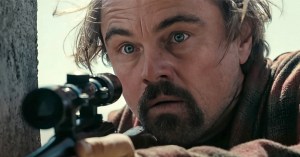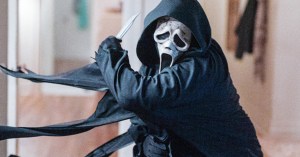Five Favorite Films with Andy Garcia
The star of City Island also discusses working with his daughter and his friendship with Al Pacino.
Andy Garcia is truly a modern renaissance man. The Oscar-nominated actor is best known for his roles in such movies as The Godfather Part III, When a Man Loves a Woman, the Ocean’s franchise, and The Untouchables, but Garcia also produces, writes, directs, and even composes music for film. As a lifelong music lover, he’s also produced Grammy-winning albums for and toured with the band of the legendary Cuban musician Israel “Cachao” Lopez, about whom he also directed a feature-length documentary.
Garcia’s latest film is City Island, a dramedy in which he plays the patriarch of a dysfunctional New York family whose propensity for keeping secrets hurtles them (sadly, but often humorously) towards an inevitable confrontation. Andy was kind enough to take some time out of his schedule to chat with RT about his Five Favorite Films, his ongoing friendship with Al Pacino, his acting process, and what it’s like to have children in the industry. Like many before him, Garcia admitted that his Five Favorites often rotate: “These are the ones that came to me today; you know, tomorrow, the list might change. Probably three out of the five might not change, but the list can kind of change, depending on what you remember.” Read on for the full interview!
The Godfather (1972,
100% Tomatometer) & The Godfather Part II (1974, 98% Tomatometer)
Well, you’d have to start with The Godfather. You’d almost have to put Part I and II together, because they were so close together, and they’re so innately tied into one another. Not to exclude Part III as a bad movie, but… I don’t see it that way, but I can’t vote for Godfather III because I’m in it. So I have to group those two together. I think those are joined at the hip, in a way.
I believe Francis Ford Coppola said something to the effect of the third Godfather film serving as an epilogue to the first two.
Right, exactly. It functions in a different way. Although, I must say that, every day of my life, I get people screaming at me in the streets, saying, “Hey, when’s Godfather IV?” I think they look at it as an ongoing serial, and they want to know more about what’s going on. So, I’m sure there’s still a franchise there if Francis wanted to approach it or Paramount wanted to approach it. I’m not sure how the dynamics of that would work these days, but I know the interest is there, only because I’m field testing it every day. Well, in the sense that I’m sort of like the barometer because people in the street go, “Hey man, when’s it going to happen?”
It certainly sounds like you’re up for it, if it happens, but regardless of that, does it ever get to a point where you tire of hearing it everywhere you go?
No, no, not at all. I’m honored to have been associated with those films, are you kidding? I mean, Godfather Part I was a movie that, certainly my generation of actors, if not every generation after it, was deeply inspired by. To be part of that was an extraordinary blessing. I don’t get tired of it. If someone says, “When’s Godfather IV?” I say, “I’m waiting along with you.” If they want to do it, that would be an extraordinary thing. Working with Francis is like working with Aristotle. He’s an extraordinary creative mind; I found that to be very stimulating.
Being There (1979, 95% Tomatometer)
Then I would have to go with Hal Ashby’s Being There. I was struck by the tone of the film and the extraordinary performances in it, starting obviously with Peter Sellers. It was one of the most sublime movies I had ever seen.
When The Pink Panther 2 opened, you mentioned how you had grown up watching Peter Sellers in the original Pink Panther films.
Right, sure, of course. He was sort of the comedic hero of the 1960s, you know. So he did a lot of those movies, and After the Fox, and I was always a big fan of his. So when they called about doing the Pink Panther film, it was just a gas to be in that credit sequence where I could be alongside an animated Pink Panther, and the [Henry] Mancini theme. Plus, it had a very nice cast, and I had good fun with it. Lighthearted.
Serpico (1973, 92% Tomatometer)
Then I would have to — and it’s hard to pick just one of his — but I would go with Sidney Lumet’s Serpico. Again, a performance-driven film, but there’s a sort of a reality to Sidney Lumet’s movies. I had the great pleasure of working with him, and there’s a reality, a sort of documentary quality to his films, you know? And it’s hard to pick from the lot of his films, whether it be Network or Dog Day Afternoon or Serpico. But there’s something about Serpico that has an emotional depth to it that was very touching. And also, it’s easy to identify with someone who’s trying to fight against the system and rise above it and do well, and the price that he pays for doing that. And Al Pacino’s performance in that movie is quite extraordinary.
Knowing that you were a fan of his, what was it like to meet him and work with him in Godfather III?
He was extremely generous, you know, very easygoing. He’s all about the work, and about the enjoyment of the work. We got to become very close allies in the movie. He treated me like his nephew and I treated him like my uncle. It was a very warm experience. He wasn’t taking me under his wing from an acting standpoint; he would never sort of presume or condescend to you in that way. It was an embrace from the point of view of, “We’re in this thing together, and this is a family, which is sort of a metaphor for the film. Just come on board. There’s nothing you need to prove; there’s nothing you need to do to sit alongside us in this theatrical experience.” So in that sense… I’m not talking about it in the sense that he was “showing me the ropes” or anything like that, you know what I mean? He wouldn’t presume to even feel like he needs to do that. It was more like, from a familiar point of view. You know, you’re a fellow actor, and coming from the stage, he knows that the stage is the great equalizer. [laughs] Everyone steps on it with equal energy, so everybody’s taking care of each other. It was a joy to work with him. And, you know, we remain good friends to this day. I mean, he’s still my “Uncle Michael.”
Mon Oncle (1958,
94% Tomatometer) & Playtime (1967, 100% Tomatometer)
Okay, I’m going to do a hybrid again. Jacques Tati’s Mon Oncle and Playtime; I’m going to put those two together. One’s sort of spun off the other, in a way, but you could put either, because it’s really about Tati himself, and the conceptual art of his films. The film that has almost no dialogue, just gibberish and music and human behavior, and staging. Competition is staging, which I found fascinating. They seduce you into paying attention to the simplest of details.
The General (1927, 92% Tomatometer)
I would go back to Buster Keaton’s The General. The accomplishment of that movie in those days, you know… First of all, Buster Keaton as an actor — and as a comedian — but as an actor really, was… again, I think the word “sublime” comes across, because of that sort of deadpan quality that he had. When he was still, you felt as though his feet had roots, and they were sort of embedded and grounded into the ground. And, you know, a hurricane could come and it would never push him over. So that sense of stillness that he had, that had this kind of emotional weight inside of it, created juxtaposition to the stuff that he would do. Even if he was moving around, there was always a sense of a “man against the world” kind of thing that was always very compelling. But that movie, what he did with that movie, with that train, and the kind of stunts he was doing on his own, and just running around… I mean, just the accomplishment of that movie from a technical standpoint in those days was quite something. So that’s my list as of today.
Next, Garcia talks about his Marlon Brando impersonation, his acting process, and working alongside his real life daughter.
RT: Let’s talk about your new film. Your character in City Island is a correctional officer and an aspiring actor who’s heavily inspired by Marlon Brando, and I’d heard that it was actually your idea to make Brando his muse.
Andy Garcia: Yeah, it was initially more general. It was more like Scorsese, DeNiro, Coppola, Brando, New York movies, posters everywhere. And I had this idea to focus it on Brando, and let it be private, not posters up on his walls and stuff like that in his office. Just keep it very private, and discover tapes that are hidden in the shed, and eventually get into this thing where Alan [Arkin] wrote this beautiful speech that dismantled the Brando thing. That was something that he wrote. Once we had layered in the Brando thing, he had an idea about pauses and Brando and all that, and he wrote that speech for his character, which was very funny. And I told [director] Ray [De Felitta], obviously about the fact that [Vince] could break into this impression without really knowing he’s doing it. Just out of complete fear and nervousness, you know. His body collapses, sort of like an allergic reaction to the audition, and goes to the only thing he knows is good acting, which is Brando. Raymond found it funny, so he said, “Let’s try it.”
And you went with it. Is that Brando impersonation something you practiced? Because it was hilarious.
I don’t know if I practiced. I just messed around with it as a joke, you know, but it’s not like I practiced it. I just kind of did it as a joke. It’s the largest laugh I’ve ever gotten in my life, with the worst impression I’ve ever done in my life. [laughs] So, there you go.
[rtimage]MapID=10011801&MapTypeID=2&photo=4&legacy=1[/rtimage]
Considering that, as well as the fact that you’re doing movies like City Island and some broader comedies like parts of the Ocean’s films and The Pink Panther, was comedy one of your passions back then, and is it still?
Yeah, definitely, and it still is. Well, you look at my Favorite Film choices, and three of my films are comedies. I think four of them are comedies, actually, if you look at Being There as a comedic film, in a way, or a dramedy.
When you were doing that audition scene in City Island, did you find yourself recalling your own auditioning experiences?
Oh sure, the anxiety of that, absolutely. That’s all working in your subconscious. You prepare yourself for that scene, and you have all that stuff working. There are scenarios when you’re starting out that are very uncomfortable, and you kind of beat yourself over the head for being so ridiculous in the room, of course.
And how exactly do you prepare for a scene in which you have to pretend to be a bad actor? Is there anything in your process you have to do differently?
Study acting all your life. No, it’s like preparing for anything else. It’s a thing that’s in the moment, you know. I don’t rehearse the scene and design the scene before I step into it; I just step into it. I prepare myself for the scene. I prepare the character, why he’s there and all that stuff. But I don’t rehearse the scene and say, “I’m going to do it this way, and this is how I’m going to say it.” I’m doing that for the first time as I’m doing the scene. So I’m just trying to live the scene in an organic and truthful way, and stay open and as spontaneous as possible with my fellow actors. I’m not preparing the scene in that way; I’m preparing the life of the character and the stakes that he’s in, and what is important to him. I’m thinking about those things; I’m not thinking about the lines or how I’m going to say them, or whatever, you know what I mean? You just step in the door and see what happens. Just live in the moment, you know?
[rtimage]MapID=10011801&MapTypeID=2&photo=5&legacy=1[/rtimage]
Looking at the supporting cast, there are a lot of actors with whom you’ve previously worked, including your daughter Dominik. I know that she’s played your daughter before, but this is the first time she’s done so as an adult. Did the lines between reality and the film ever blur during those scenes you shared with her? When you’re playing her father and having these interactions with her, does your relationship with her influence and inform your character?
I certainly hope so. Why would we ignore that? No, of course, I mean, one of the things that I remember from working with Al [Pacino] on The Godfather… The way we worked on the relationship was just to be together as much as possible off camera. Go to dinner and hang out, and we never talked about the scenes, or rehearsed the scenes. We worked on our relationship so that when the cameras would roll, that sense of family, that sense of comfort, that’s understood already. It was there. So in a case where you’re working with your own daughter, why would you want to ignore all that history? You know, as an actor, you’re trying to create that history with your fellow actor, like I would create a history with Steven Strait or Ezra Miller in the movie. You know, I have to cheat my subconscious into thinking, “This is my son,” and look at him in the eye and hold him and kiss him and run my hands through his hair. He’d go, “What are you doing?” and I’d go, “Leave me alone. You’re my son; I’m your father. I can do whatever I want.” You know what I mean? And get close to him, and bond with him, so when we’re on camera, that can be there.
Are you very hands-on with Dominik’s acting career?
No, no, not at all. Both she and my middle daughter Daniella are actresses. They’ve chosen that as their careers; my middle daughter’s just graduating from college at Cal Arts. What I’ve told them, at least, about the preparation, is to study and prepare yourself for your career, seriously, which they’ve done all their life; they’ve always been very passionate about it. And then, of course, we talk about what kind of acting we respond to, and what they’ve seen. We talk about the work, like “Oh, you should’ve seen this guy. So-and-so was so good,” or “You should have seen Meryl in that movie,” or whatever. We talk about the work. When [Dominik]’s acting, that’s her thing, that’s her art, unless I’m directing her, which I have. But in City Island, we’re colleagues and we’re helping each other as actors. If I see she’s stuck, then as an actor, I would try to help her, you know, just like if I’m stuck, she’ll try to give me something. It’s her art; she has her process like I have mine. We both strive for the same thing, but we each have our process. When the door closes behind you, you’re on your own, so you gotta be ready to do your thing.
Check out Andy Garcia in City Island, which opened in limited release on March 19 and will continue to expand throughout the Spring. Check out the movie’s official website, or become a fan on Facebook.
For more Five Favorite Films,
visit our archive.











